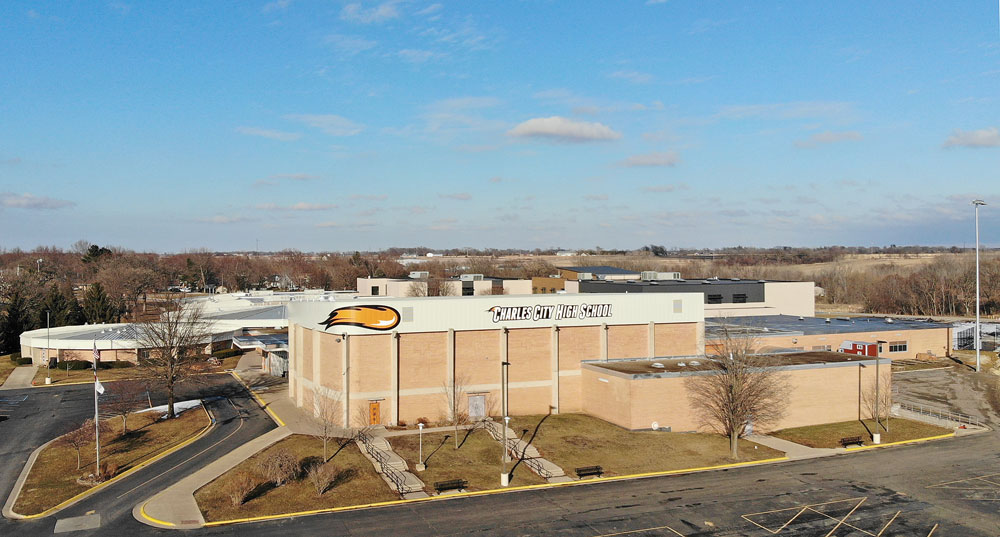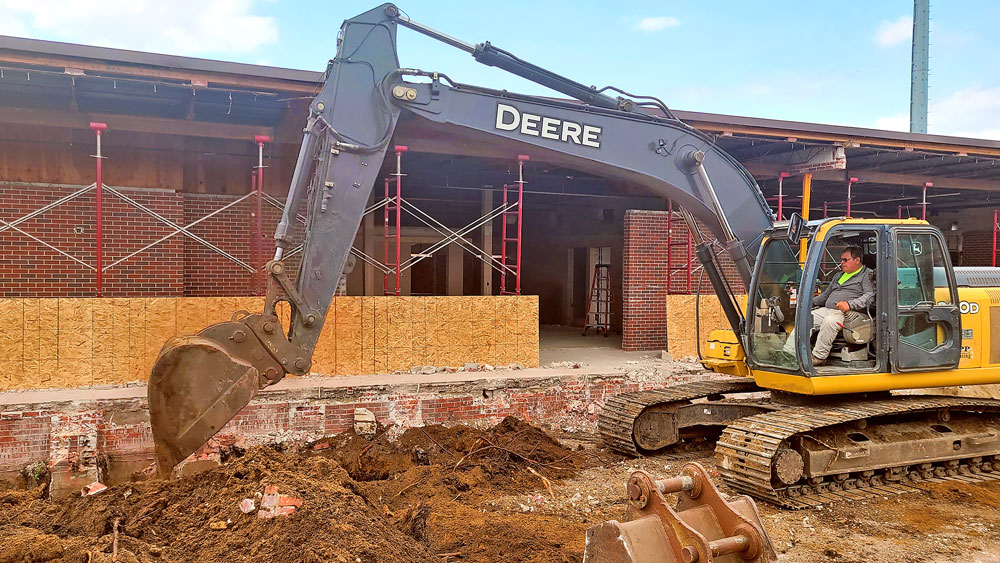McQuillen Place files for bankruptcy, puts a halt to other legal proceedings

By Bob Steenson, bsteenson@charlescitypress.com
McQuillen Place Co. LLC filed for bankruptcy last week, effectively stopping for now foreclosure proceedings against the company that has been trying to build a large, multi-million-dollar residential and commercial development on Charles City’s Main Street.
The action was filed in U.S. Bankruptcy Court for the North District of Iowa on Thursday, listing more than $3.2 million in unsecured claims for the top 20 creditors.
The action was filed by Charles Thomson of Charles City, the local attorney and developer who has been the driving force behind the downtown project, and who has put up most of the collateral on the mortgage.
The name of the project, McQuillen, is his grandfather’s family name, and Thomson’s middle name.
Thomson told the Press Sunday he didn’t have any comment on the record yet regarding his decision to file for Chapter 11 bankruptcy, but he would issue a statement in the next day or two.
The bankruptcy filing is the latest in a legal morass that has enveloped the project in the last couple of years since construction stalled in 2017, with claims and counterclaims filed among McQuillen and several creditors and collateral holders, especially the project’s primary creditor, First Security Bank and Trust in Charles City, which holds the construction mortgage.
Kurt Herbrechtsmeyer, president and CEO of First Security, told the Press on Friday that the bankruptcy filing will likely delay the eventual outcome of the project.
“We’re gonna stay the course and see this through and get this project finished one day,” he said. “That’s all we’re gonna keep doing, is moving forward.
“I still feel very confident the project will get completed,” he said. “It’s just a question of when and by whom.”
Herbrechtsmeyer said the bank would “be taking appropriate action as well to protect ourselves and try to get it to a resolution.”
He said the bank had been looking at a foreclosure trial scheduled for November “to at least resolve the ownership in the dispute and move forward,” but now he isn’t sure when that will happen.
“It’s just going to get more and more interesting. The only thing I’m confident in is that it’s going to delay even longer. That part’s disappointing,” Herbrechtsmeyer said.
Two of the latest legal actions, where hearings had been scheduled to take place Friday morning, were stopped at least temporarily by the bankruptcy filing.
In the first, McQuillen Place Co. had filed suit against the Iowa Economic Development Authority, asking for judicial review of a decision that the state agency had made to pull about $500,000 in enterprise zone tax credits, which were an important part of the financing package and had been tied up in guarantees for other loans, including the mortgage.
The IEDA said the McQuillen project had failed to meet a two-year construction deadline.
But Judith O’Donohoe, a Charles City attorney representing the project, said the state agency had failed to notify McQuillen of its two-year deadline, had previously allowed waivers of the time limit for other projects, and that it failed to grant the project a rehearing on the decision, as should have been allowed by its procedures.
The first hearing scheduled for Friday had been on a motion by the IEDA to dismiss McQuillen’s request for judicial review of the decision, saying the district court did not have jurisdiction and had no power to resolve the situation.
The other action that had been set to take place Friday morning was on a motion by First Security Bank to have a receiver appointed to take possession of the project to make sure that it did not suffer damage while construction has stopped and it sits unoccupied.
Among a long list of claims the bank’s attorneys made in their motion was that it was concerned the condition of the property would deteriorate because of water leakage. It also estimated it would still cost at least $1 million to complete the project.
In an answer to the petition, O’Donohoe said professionals familiar with the construction did not feel any of the damage issues raised by the bank were more than cosmetic and easily correctable, and that recently persons engaged by McQuillen Place Co. had applied caulking and other materials to eliminate any water penetration.
District Court Judge Colleen Weiland told the Press Friday that the court had just become aware of the bankruptcy filing.
“That became effective just this morning, so that enters a stay, meaning we halt all the proceedings in the foreclosure and related actions,” Weiland said, “although I have to do some research about what happens in regard to staying against the other parties and the counterclaims.”
The judge also said she wasn’t sure if the bankruptcy filing affects the state’s motion to dismiss McQuillen’s suit against the IEDA.
She said she would check back with the attorneys in that case, O’Donohoe, representing McQuillen, and Iowa Assistant Attorney General Alan Nagel, representing the IEDA, in about a month to see what was happening regarding the bankruptcy.
“We’re just informally staying that to decide if the bankruptcy stay is effective in that,” she said.
McQuillen is filing for Chapter 11 bankruptcy, meaning it wants to try to restructure its debt by creating a plan so creditors could be repaid and the company could retain possession of the project.
Listed among the top 20 creditors on the bankruptcy application are First Security, with a debt of $3.25 million listed as an unsecured deficiency claim, partially secured by $500,000 in collateral.
That claim is listed on the bankruptcy filing as disputed, and First Security has said in its foreclosure motions that the total debt with interest and other expenses is now more than $4 million, and lists collateral on the construction mortgage of the project of more than $6 million.
The second largest creditor is listed as the Floyd County Treasurer, for $212,530 in unpaid property taxes.
The next highest creditor listed is Schindler Elevator Corp., of Holland Ohio, which has a disputed mechanic’s lien against the property for $59,907.
All the other top 20 creditors are owed less than $32,000 each, with most of them owed amounts in the four-figure range.
The total claims listed for the top 20 creditors is $3.7 million, with $500,000 of that listed as secured.
The McQuillen Place project was announced in January 2013 as a 50,000-square-foot collection of retail stores and apartments with a total price tag that has been variously listed as between $8.6 million and $13 million.
The project was announced by brothers Charles and Peter Thomson, who jointly operate Amelia Management, a Charles City-based real estate development company. Another brother, Steven, was also a partner. Steven died in 2017.
The proposal was for a Victorian-style building to be constructed on nine lots in downtown Charles City that had been vacant for more than 20 years, with 33 apartments on the second and third floors of the building and a row of up to eight retail stores on the ground level along Main and Clark streets.
After construction stalled in 2016, work picked up again for a while in the summer of 2017 as finishing on the outside of the building resumed and a clock tower and weathervane were installed on the corner of the building.
In late July 2017, the building was blessed by a Catholic priest as construction continued, but construction soon stalled again.









Social Share